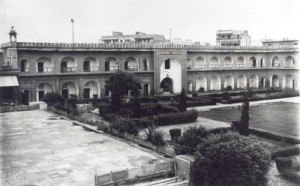Faizur Rasul (b. 1910): Education & Schooling
Faizur Rasul was never interested in his school life when he was younger. Instead, he became inspired by Gandhi and was consequently swallowed up in the excitement of the first move for Indian independence. Rasul left school because of this, and after the movement fizzled out he “could not pick up the threads of my education where I had left off” (9). This does not mean that he shunned learning however. He began to read profusely, predominantly Bernard Shaw and H. G. Wells, the effect of which is evident in his writing. Large sections where he is recounting discussions come in the form of a script, just like Shaw’s plays. The influence of these writers can be seen in the introductory blog post, as well as in purpose and audience, so the topic will not be lingered on.

Rasul travels to Delhi and finds lodging working in the Anglo-Arabic College, a boarding school, despite the superintendent of the college insisting that “there was no vacany” (56). Rasul circumnavigates this problem by befriending the superintendent, persuading him to offer him lodgings and work by telling him “to cheat the English was a national duty” (56), as the principal was an Englishman. This persuasive manner he must have learnt from his time at the market where he had to convince passers-by to purchase his wares. Ironically, the skills he has developed outside of formal education have led him back to the very place that he shunned years ago: another school.
The college itself is an extremely interesting building, as Rasul touches on. It “was a palace dating from Mogul times” (57), and was intruded by the East India Company in 1827, where it was used to teach English topics to students. It still exists today as the Anglo Arabic school as one of the oldest buildings in Old Delhi.
My father was disillusioned, and decided that I should leave school, instead of wasting money that could hardly be spared. (10)
Since he is not able to participate in classes with the students that he also befriends, Rasul takes his education in to his own hands. He begins to learn about the history and culture of Delhi, taking in “the relics and ruins of the old forts, tombs, palaces, and mausoleums that had been left by this or that conqueror or ruler of Hindustan” (59). It is far from formal education, in fact, Rasul sees it as a way to fill his time whilst he is not working, but it is clear that his thirst for knowledge is still there.
Education is a luxury that costs money, and like other working class individuals it was part of the reason why Rasul left school. Therefore, the main vehicle for Rasul’s education became experience. The existence of his published piece of work bears testament to how much that has taught him: number one, the ability to write a book, and number two, that he has had enough experience to be able to fill one. He possesses knowledge and understanding gained through curiosity and desire, a world away from the rigidly schooled inhabitants of the Anglo-Arabic College with whom he shared residence.
Bibliography
Rasul, Faizur. From Bengal to Birmingham. (London: Andre Deutsch, 1967)

Leave a Reply